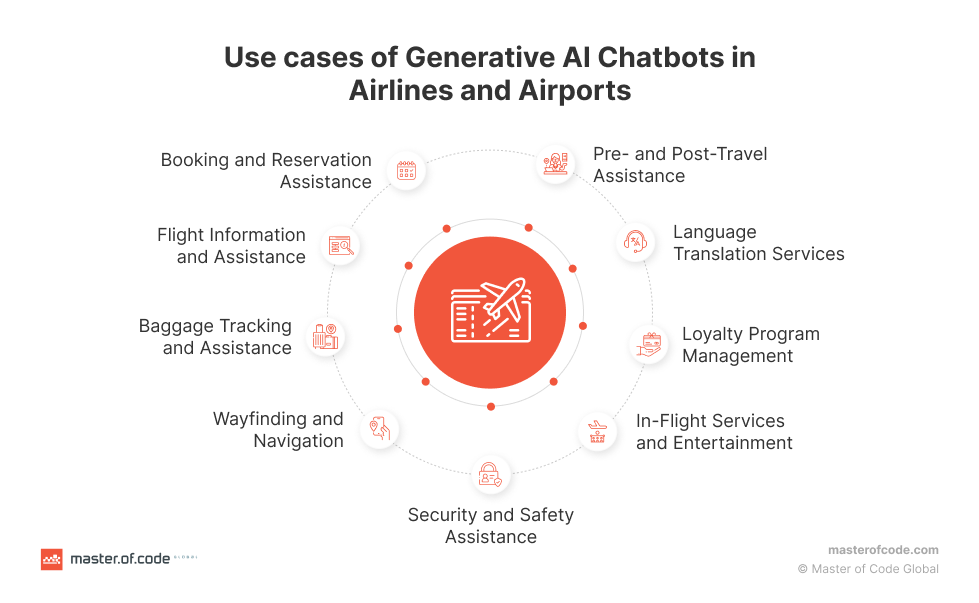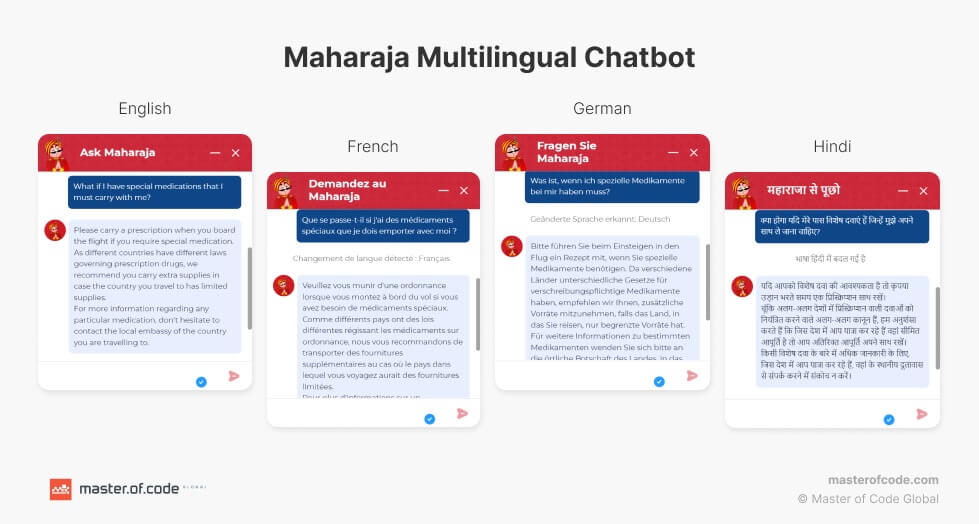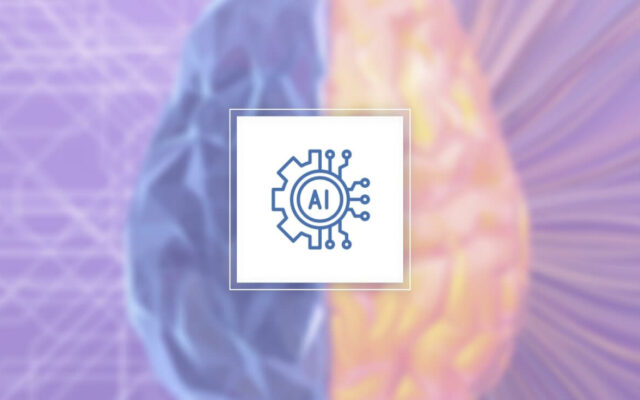Numerous companies across various industries are adopting Generative AI and other forms of AI to drive revenue growth, minimize expenses, enhance customer satisfaction, and raise the speed and quality of decision-making processes.
According to Juniper Research, businesses are expected to save $11 billion each year by 2023 through the utilization of chatbots like ChatGPT. Furthermore, as indicated by a report from Salesforce, 64% of consumers and 80% of business buyers anticipate real-time responses and interactions from companies. By implementing Generative AI chatbots to deliver fast responses to customer questions, airlines can fulfill these expectations and enhance customer experience.
In PWC’s latest report, it was identified that the airline industry has the largest disparity of 33% between customer expectations and the actual customer experience. It is a significant challenge that needs to be addressed. However, Generative AI is poised to assist in enhancing the airline industry by delivering a more personalized and efficient experience for customers.
Generative AI chatbots for airports and airlines assist travelers by providing flight information, directions, and addressing various questions. With the use of Generative AI chatbots, aviation and airlines can analyze passenger data, including flight history and preferences, to offer personalized recommendations for services such as dining or shopping. By predicting demand and adjusting inventory levels accordingly, essential products and services can be made available to passengers. The Generative AI chatbots can also assist airports in scheduling and prioritizing maintenance tasks for facilities and equipment based on factors such as usage patterns and historical performance. Generative AI has the potential to change the aviation industry by delivering intelligent services to travelers and enhancing operational efficiency. So let’s take a closer look at the use cases of using Generative AI in aviation and airlines.
Table of Contents
Use cases of Generative AI in Aviation and Airlines

Thinking of incorporating Generative AI chatbot? At Master of Code Global, we can seamlessly integrate Generative AI into your current chatbot, train it, and have it ready for you in just two weeks, or build a Conversational solution from scratch.
Use case of Generative AI Chatbots in Aviation and Airlines #1. Booking and Reservation Assistance
Generative AI chatbots can provide valuable assistance to passengers when it comes to booking flights, selecting seats, and making reservations for various airport services. These chatbots are equipped with the ability to understand and process passenger requests, allowing them to offer personalized recommendations and ensure a smooth booking experience. Over the past year, we’ve helped our clients invest in Conversational AI solution and increased 7.67x weekly bookings or conversion rate 3x higher since the chatbot was launched.
Passengers can interact with the airline chatbot to inquire about flight availability, fares, and schedules. Based on their preferences and requirements, the chatbot can provide suitable options, including alternative flights or nearby airports, helping passengers make informed decisions. The chatbot can also assist in seat selection, allowing passengers to choose seats based on their preferences, such as window or aisle seats, or proximity to other passengers.
Furthermore, Generative AI chatbots can facilitate reservations for additional airport services, such as airport lounges or car rentals. Passengers can specify their choices, such as desired amenities in a lounge or specific car models for rentals, and the chatbot can recommend suitable options based on availability and passenger preferences. Generative AI chatbots in aviation suggest alternatives that align with the passenger’s chosen criteria, making the booking process more convenient and tailored to individual needs.
Etihad Airways is preparing to introduce a new feature that enables customers to make flight bookings using artificial intelligence. This innovative technology allows customers to input their basic details into the BOTIM chat app, which will then handle the entire booking process on their behalf. One of the notable features of the BOTIM app is its generative pre-trained transformer (GPT), which has gained global recognition since OpenAI’s ChatGPT was launched in November 2022. What sets Etihad Airways apart is that their GPT will be the first to support both English and Arabic languages, ensuring a more inclusive and accessible experience for customers.
In addition to modifying the booking process, Etihad Airways is embracing technology in other aspects of their operations. The airline recently introduced a complimentary onboard chat service on its widebody aircraft, enabling passengers to use popular chat apps like WhatsApp, WeChat, and Messenger throughout their flight.
Use Case of Generative AI Chatbots in Aviation and Airlines #2. Flight Information and Assistance
Generative AI chatbots can be deployed at airports to provide real-time flight information and assistance to passengers. These chatbots can answer queries about flight schedules, delays, gate changes, baggage information, and more, helping passengers stay informed and reducing the workload on airport staff.
As per Accenture’s findings, 83% of airline customers expect to receive responses to their inquiries within a 24-hour timeframe. By leveraging Generative AI chatbot, airlines can provide real-time responses to customer queries, significantly reducing their response times and meeting customer expectations promptly.
Generative AI chatbots can be implemented at airports to offer real-time flight information and assistance to passengers. For instance, a passenger may approach the chatbot and ask about their flight schedule or any potential delays. The airport chatbot can promptly provide accurate and up-to-date information, ensuring that passengers are well-informed about their flights.
In another scenario, if there is a gate change, passengers can rely on the Generative AI chatbot to notify them and provide directions to the new gate. This helps prevent confusion and ensures that passengers reach their departure gates without any issues.
Additionally, Generative AI chatbots can assist with questions related to baggage. Passengers can ask about baggage allowances, restrictions, and procedures. The chatbot can provide clear and concise information, ensuring that passengers understand the requirements and have a hassle-free experience during check-in and baggage handling.
Use case of Generative AI Chatbots in Aviation and Airlines #3. Language Translation Services
Airports serve a diverse range of international travelers who may encounter language barriers during their journey. Generative AI chatbots, equipped with advanced natural language processing capabilities, can play a vital role in bridging these communication gaps by offering language translation services.
One of the examples of the using generative AI, passengers can rely on Generative AI chatbots to communicate with airport personnel or seek information in their preferred language. The chatbot can accurately translate their questions, inquiries, or directions into the desired language, ensuring clear and effective communication.
For example, a traveler who speaks Spanish can approach the chatbot and ask for directions to a specific gate in their native language. The chatbot can swiftly translate the question and provide detailed directions in English or any other language required. This seamless translation process saves time and eliminates confusion for passengers.
Generative AI chatbots for aviation can support multiple languages, allowing them to cater to a wide range of travelers from different linguistic backgrounds. By leveraging their natural language processing capabilities, these chatbots can provide accurate translations for both simple and complex inquiries, ensuring that passengers receive the information they need in a language they understand.
Air India has gotten on a digital transformation journey by implementing a ChatGPT-driven chatbot and other innovative initiatives. The airline has invested an initial sum of USD 200 million in modernizing its digital systems. Maharaja, Air India’s AI-powered chatbot has undergone extensive training to address a wide range of customer questions related to bookings, cancellations, baggage policies, loyalty programs, and more.

Applying the power of ChatGPT technology, Maharaja is now equipped to provide comprehensive assistance for all aspects of travel. Whether you have questions about baggage, bugles, or even beagles, Maharaja is there to lend a helping hand. With each interaction, the chatbot continues to enhance its knowledge and capabilities. Engaging with Maharaja is effortless – simply start a conversation in your preferred language, which currently includes Hindi, English, French, and German. The chatbot understands and responds accordingly, and you can switch to another language at any time by typing in the desired language.
Moreover, the chatbot’s language translation services can extend beyond basic directions or questions. It can also assist with translations for essential airport services, such as check-in procedures, security protocols, baggage instructions, or immigration requirements. By breaking down language barriers, Generative AI chatbots contribute to a smoother and more inclusive travel experience for international passengers.
Use case of Generative AI Chatbots in Aviation and Airlines #4. Wayfinding and Navigation
Navigating through airports, with their complex and expansive layouts, can often be a source of confusion and stress for passengers. However, Generative AI chatbots have the potential to alleviate these challenges by providing informative and interactive wayfinding and navigation assistance.
Passengers can rely on Generative AI chatbots in airports to offer precise directions to various airport destinations, including departure gates, baggage claim areas, lounges, restaurants, or other facilities. The chatbot can provide step-by-step instructions tailored to the passenger’s specific location within the airport.
To raise the navigation experience, Generative AI chatbot in airport can even display maps on passengers’ mobile devices, ensuring they have a visual representation of their route. These maps can highlight key landmarks, restrooms, ATMs, or other amenities along the way, making it easier for passengers to identify their surroundings and follow the recommended path.
Generative AI in aviation can adapt to changing circumstances within the airport. For instance, if there is a gate change or unexpected closure of a facility, the chatbot can quickly update the directions and provide alternative routes to guide passengers effectively.
Use case of Generative AI Chatbots in Aviation and Airlines #5. Security and Safety Assistance
Ensuring the safety and security of passengers is of paramount importance for airports. Generative AI chatbots in airports can play a significant role in this area by providing comprehensive assistance and guidance to passengers.
One of the key aspects where Generative AI chatbots can assist is in providing information on security procedures. Passengers can interact with the chatbot to learn about the items that are allowed in carry-on luggage, prohibited items, and any specific requirements for screening. The chatbot can offer detailed explanations, ensuring that passengers are well-informed and compliant with security regulations, ultimately expediting the screening process.
In addition to routine security procedures, Generative AI chatbots can also be instrumental in emergency situations or incidents. These aviation chatbots can provide real-time updates and instructions to ensure passenger safety. For example, in the event of a security threat or natural disaster, the chatbot can deliver important information, such as evacuation procedures, designated safe zones, or emergency contact numbers. This real-time assistance can help passengers navigate through unexpected situations more effectively and mitigate potential risks.
Generative AI technology can improve security measures at airports through face identification and verification systems. By utilizing multiple photos taken from different angles, the technology can create a comprehensive full-face picture of a passenger. This enables airports to more accurately identify and verify the identity of travelers, enhancing security protocols and reducing the possibility of fraudulent activities.
Use case of Generative AI Chatbots in Aviation and Airlines #6. In-Flight Services and Entertainment
Airlines have the opportunity to raise in-flight services and entertainment options by leveraging Generative AI chatbots. These airline chatbots can provide a range of services to passengers, catering to their individual preferences and ensuring an enjoyable in-flight experience.
Passengers can use the airline chatbot to request special meals based on their dietary requirements or tastes. Whether it’s a vegetarian, gluten-free, or kosher meal, the chatbot can assist in making the necessary arrangements, ensuring that passengers are provided with suitable meal options during their flight.
Moreover, Generative AI chatbots can serve as a valuable resource for passengers to inquire about onboard amenities. Passengers can ask questions regarding available facilities, such as Wi-Fi availability, charging ports, or the availability of in-flight entertainment systems. The chatbot can promptly provide information and help passengers make the most of the available onboard amenities.
Additionally, Generative AI chatbots for airlines can offer individualized entertainment recommendations to passengers. By analyzing passengers’ preferences, such as favorite genres, movies, or music, the chatbot can suggest tailored entertainment options, ensuring that passengers have access to content that aligns with their interests.
Furthermore, the airline chatbots can introduce interactive elements to the in-flight experience, such as games or quizzes. Passengers can engage with the chatbot in interactive activities, providing entertainment and a way to pass the time during the flight. This feature adds an element of fun and engagement to the in-flight journey, enhancing the overall passenger experience.
Use case of Generative AI Chatbots in Aviation and Airlines #7. Loyalty Program Management
Airlines frequently establish loyalty programs to reward and retain their frequent flyers. Generative AI chatbots present an excellent opportunity to streamline the management of these loyalty programs, providing passengers with a seamless and rewarding experience.
Passengers can rely on Generative AI chatbots to efficiently manage their loyalty accounts. By interacting with the airline chatbot, passengers can check their points or miles balance in real-time. This feature keeps passengers updated on their current loyalty status, empowering them to make informed decisions regarding their rewards and benefits.
The airline chatbot can also provide valuable information on available rewards within the loyalty program. Passengers can inquire about various redemption options, such as free flights, cabin upgrades, access to airport lounges, or exclusive discounts. The chatbot can provide detailed information on the requirements and availability of these rewards, allowing passengers to make well-informed choices.
The implementation of Generative AI chatbots enables efficient and convenient communication at every stage of the traveler’s journey, leading to increased revenue and reduced operational costs. This focused messaging approach facilitates smooth and hassle-free bookings, ultimately resulting in a higher number of upgrades for passengers.
As reported by Persado, an airline successfully increased its revenue by 48% through the utilization of a web banner promoting first-class seat bookings. This significant boost in revenue amounted to an additional $8 million in earnings for the airline. Generative AI technology for airlines enables operators to effectively promote additional products or services to customers through individualized and tailored communication strategies.
Generative AI chatbots can assist passengers in the process of redeeming rewards. Passengers can interact with the airline chatbot to initiate the redemption process, whether it’s booking a flight using loyalty points, upgrading their seat, or availing themselves of other program benefits. The chatbot can guide passengers through the necessary steps, ensuring a seamless and efficient redemption experience.
Use case of Generative AI Chatbots in Aviation and Airlines #8. Baggage Tracking and Assistance
Generative AI in aviation offer valuable support to passengers in tracking their baggage throughout their journey. Passengers can input their baggage information, such as the bag tag number, into the chatbot, which then applies advanced tracking systems to provide real-time updates on the location of their bags.
This feature significantly reduces stress and uncertainty for passengers, as they can easily check the status of their baggage right from their mobile devices. The chatbot can inform passengers about the current whereabouts of their bags, whether they are in transit, loaded onto the aircraft, or ready for pickup at the destination. This information allows passengers to have peace of mind and better plan their next steps.
Moreover, Generative AI chatbots can assist passengers in reporting lost or damaged baggage. If a passenger discovers that their baggage is missing or has been damaged during the journey, they can notify the chatbot, which will guide them through the necessary steps for reporting the incident.
The chatbot can provide relevant instructions on filling out the required forms, documenting the details of the baggage, and connecting the passenger with the appropriate airport staff or airline representatives who can assist further. By streamlining the process and offering clear guidance, the airport chatbot helps expedite the resolution of such issues.
Use case of Generative AI in Aviation and Airlines #9. Pre- and Post-Travel Assistance
Generative AI in Travel industry provide with extensive pre- and post-travel assistance, ensuring a smooth and convenient experience throughout their journey.
Before the trip, the airline chatbot serves as a valuable resource for passengers, offering essential information on travel requirements. This includes details on visa regulations, passport validity, and specific entry or health protocols, such as COVID-19 travel restrictions. Generative AI chatbot can provide accurate and up-to-date information, ensuring that passengers are well-prepared and compliant with the necessary travel guidelines.
Additionally, Generative AI chatbots can assist passengers in planning their travel itineraries. Passengers can seek recommendations on popular attractions, local customs, or transportation options at their destination. The airline chatbot can offer individualized suggestions based on a passenger’s tastes, budget, or travel dates, enhancing their travel planning experience.
After the trip, the airline chatbot continues to provide valuable support. Passengers can use the chatbot to submit feedback or reviews about their travel experience. This feedback can help airlines or airports identify areas for improvement and raise their services in the future. Additionally, the chatbot can assist passengers in handling refund or compensation requests, should any issues arise during the journey.
Moreover, the chatbot can address any post-travel questions or concerns that passengers may have. Whether it’s a lost item, a billing discrepancy, or general inquiries about their travel experience, the airline chatbot can provide prompt and accurate responses. This ensures that passengers receive the necessary assistance and have their concerns addressed in a timely manner.
Benefits of Generative AI in Aviation and Airlines

- Cost Savings: Implementing Generative AI chatbots can lead to significant cost savings for airlines. They can handle routine customer inquiries, reducing the need for large customer support teams. This cost-effective solution allows airlines to allocate resources more efficiently and invest in other areas of their business.
- Operational Efficiency: Generative AI chatbots can handle a large volume of inquiries simultaneously, freeing up human agents to focus on more complex tasks. This improves operational efficiency by reducing wait times, increasing productivity, and optimizing resource allocation.
- Tailored Approach: By analyzing passenger data and preferences, Generative AI chatbots can offer individualized recommendations for services like seat upgrades, in-flight entertainment, or special offers. This tailored approach enhances the customer experience and increases the likelihood of upselling.
- Real-time Updates: Generative AI chatbots can provide real-time updates on flight statuses, delays, and gate changes, keeping passengers informed and minimizing confusion. By delivering timely and accurate information, airports can improve passenger satisfaction and reduce the number of inquiries directed to staff.
- Enhanced Safety and Security: Generative AI chatbots can provide guidance on security procedures, alert passengers about potential safety hazards or emergencies, and offer instructions during critical situations. By proactively monitoring security systems and integrating with existing airport infrastructure, Generative AI chatbots can contribute to improve safety and security measures.
- Multilingual Support: Generative AI chatbots can support multiple languages, assisting international travelers who may face language barriers. By providing language translation services, airports can improve communication and ensure a seamless experience for passengers from different linguistic backgrounds.
Conclusion
In conclusion, the integration of AI chatbots in airports and airlines offers numerous advantages. These chatbots efficiently help travelers by providing accurate flight information, tailoring services according to passenger preferences, anticipating demand for essential products, and optimizing maintenance activities. Moreover, they enhance safety and security measures by delivering valuable guidance, timely alerts, and crucial instructions during emergencies. Finally, Generative AI solutions have the potential to revolutionize the airport, aviation and airline experience, offering intelligent services, streamlining operations, and ensuring a seamless journey for travelers.
Don’t miss out on the opportunity to see how Generative AI chatbots can revolutionize your customer support and boost your company’s efficiency.






